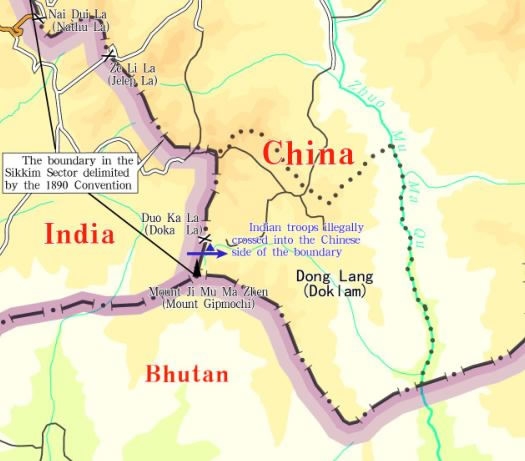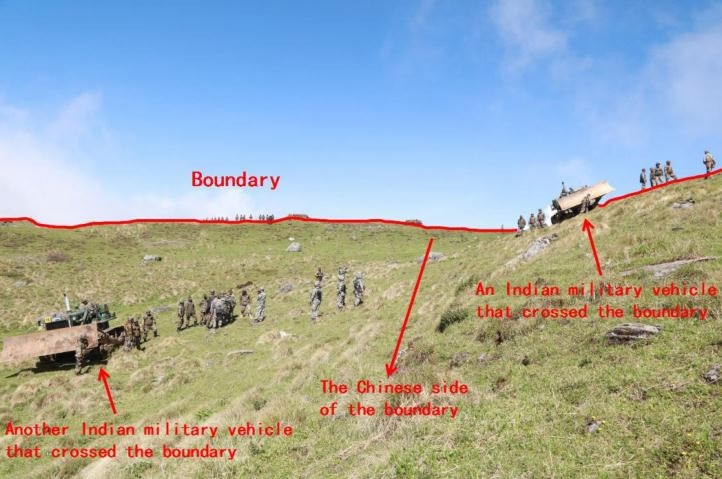The border dispute between China and India in the Dong Lang area (Doklam) is "fundamentally different from past frictions" between the two sides because the incident happened in "indisputably Chinese territory," Chinese Foreign Ministry said in a statement released on Wednesday.
"The incident occurred in an area where there is a clear and delimited boundary," the statement explained. "This makes it fundamentally different from past frictions between the border troops of the two sides in areas with undelimited boundary."
This is the most comprehensive statement by China on the border standoff that has lasted for a month and a half.

A sketch map of the site of the Indian troops' trespass. /Chinese Foreign Ministry Photo
The Chinese Foreign Ministry denounced the Indian border troops for illegally crossing the two countries' boundary in the Sikkim Sector on June 18 and urged India to "immediately and unconditionally withdraw" its troops.
China has shown "utmost goodwill" and "great restraint" over the incident, but its resolve to defend its territorial sovereignty should never be underestimated, the statement stressed, adding that Beijing "will take all necessary measures to safeguard its legitimate and lawful rights and interests."
Over 40 Indian troops still on Chinese territory
The Dong Lang area, located in Yadong county of the Tibet Autonomous Region of China, is "indisputably Chinese territory" according to the Convention Between Great Britain and China Relating to Sikkim and Tibet signed in 1890, the statement said.
The government of the People's Republic of China, founded in 1949, and that of India, which gained independence from the UK in 1947, inherited the convention and the delimited boundary accordingly, the 15-page document noted.

The Indian troops' trespass into the Chinese territory. /Chinese Foreign Ministry Photo
According to the Chinese Foreign Ministry, over 270 Indian border troops crossed the boundary in the Sikkim Sector at the Duo Ka La (Doka La) pass and entered the Chinese territory on June 18. The number of the trespassing Indian troops reached over 400 at one point. They have put up three tents and advanced over 180 meters into the Chinese territory.
There were still more than 40 Indian troops and one bulldozer "illegally staying in the Chinese territory" at the end of July, the ministry revealed.
The statement called the Indian troops' crossing of the mutually-recognized boundary a "real attempt to change the status quo."
India's so-called 'security concerns' untenable
India cited "serious security implications" of China's road building in Dong Lang area as a justification for its move. But Beijing described it as an "untenable" excuse.
The statement called China's road building on its own territory "completely lawful and legitimate," noting that the move aims to improve local transportation.
"China did not cross the boundary in its road building," the statement added. "And it notified India in advance in full reflection of China's goodwill."
The Chinese Foreign Ministry underscored that "no consideration of whatsoever nature" could justify the "invasion or attack by the armed forces of a State of the territory of another State" according to UN General Assembly Resolution 3314 adopted on December 14, 1974.
Therefore, India has violated the international law by crossing the delimited boundary "on the ground of so-called 'security concerns'," the ministry stated.
China-Bhutan boundary issue has nothing to do with India
China and Bhutan have conducted 24 rounds of talks to resolve their boundary issue since the 1980s and reached a broad consensus.
"The China-Bhutan boundary issue is one between China and Bhutan. It has nothing to do with India," the statement clarified, stressing that India has no right to "make territorial claims on Bhutan's behalf."
India has not only violated China's sovereignty but also "challenged Bhutan's sovereignty and independence" by using Bhutan as an excuse to intrude into the Chinese territory, the Chinese Foreign Ministry indicated.
At a press conference on Wednesday, Chinese Foreign Ministry spokesman Geng Shuang said the statement aims to lay out the facts and truth of the illegal trespass of the Indian border troops to the international community and give a full account of the position of the Chinese government.
"China is committed to not only defending its territorial sovereignty but also safeguarding the basic principles of international law and the basic norms governing international relations and upholding justice and righteousness," he added.
Related stories:
'If you don't want war, go away from Chinese territory': Chinese colonel tells Indians









